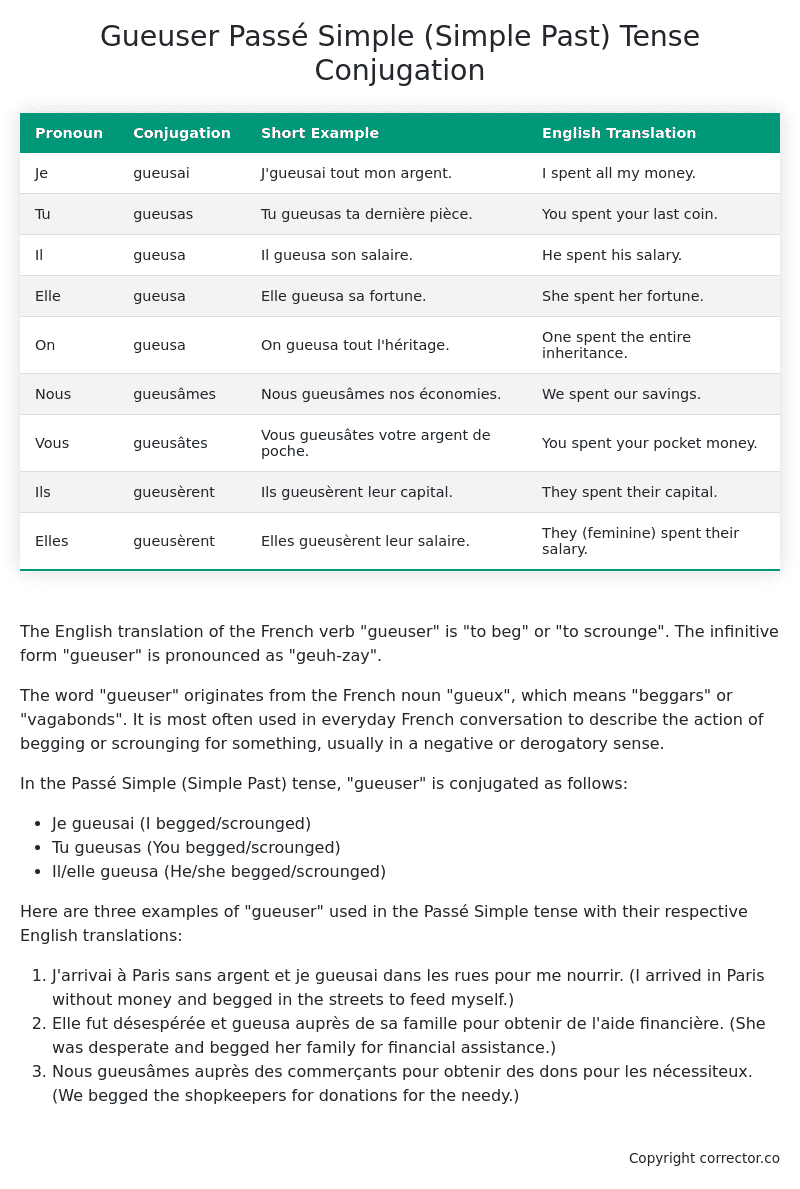Passé Simple (Simple Past) Tense Conjugation of the French Verb gueuser
Introduction to the verb gueuser
The English translation of the French verb “gueuser” is “to beg” or “to scrounge”. The infinitive form “gueuser” is pronounced as “geuh-zay”.
The word “gueuser” originates from the French noun “gueux”, which means “beggars” or “vagabonds”. It is most often used in everyday French conversation to describe the action of begging or scrounging for something, usually in a negative or derogatory sense.
In the Passé Simple (Simple Past) tense, “gueuser” is conjugated as follows:
- Je gueusai (I begged/scrounged)
- Tu gueusas (You begged/scrounged)
- Il/elle gueusa (He/she begged/scrounged)
Here are three examples of “gueuser” used in the Passé Simple tense with their respective English translations:
- J’arrivai à Paris sans argent et je gueusai dans les rues pour me nourrir. (I arrived in Paris without money and begged in the streets to feed myself.)
- Elle fut désespérée et gueusa auprès de sa famille pour obtenir de l’aide financière. (She was desperate and begged her family for financial assistance.)
- Nous gueusâmes auprès des commerçants pour obtenir des dons pour les nécessiteux. (We begged the shopkeepers for donations for the needy.)
Table of the Passé Simple (Simple Past) Tense Conjugation of gueuser
| Pronoun | Conjugation | Short Example | English Translation |
|---|---|---|---|
| Je | gueusai | J’gueusai tout mon argent. | I spent all my money. |
| Tu | gueusas | Tu gueusas ta dernière pièce. | You spent your last coin. |
| Il | gueusa | Il gueusa son salaire. | He spent his salary. |
| Elle | gueusa | Elle gueusa sa fortune. | She spent her fortune. |
| On | gueusa | On gueusa tout l’héritage. | One spent the entire inheritance. |
| Nous | gueusâmes | Nous gueusâmes nos économies. | We spent our savings. |
| Vous | gueusâtes | Vous gueusâtes votre argent de poche. | You spent your pocket money. |
| Ils | gueusèrent | Ils gueusèrent leur capital. | They spent their capital. |
| Elles | gueusèrent | Elles gueusèrent leur salaire. | They (feminine) spent their salary. |
Other Conjugations for Gueuser.
Le Present (Present Tense) Conjugation of the French Verb gueuser
Imparfait (Imperfect) Tense Conjugation of the French Verb gueuser
Passé Simple (Simple Past) Tense Conjugation of the French Verb gueuser (You’re reading it right now!)
Passé Composé (Present Perfect) Tense Conjugation of the French Verb gueuser
Futur Simple (Simple Future) Tense Conjugation of the French Verb gueuser
Futur Proche (Near Future) Tense Conjugation of the French Verb gueuser
Plus-que-parfait (Pluperfect) Tense Conjugation of the French Verb gueuser
Passé Antérieur (Past Anterior) Tense Conjugation of the French Verb gueuser
Futur Antérieur (Future Anterior) Tense Conjugation of the French Verb gueuser
Subjonctif Présent (Subjunctive Present) Tense Conjugation of the French Verb gueuser
Subjonctif Passé (Subjunctive Past) Tense Conjugation of the French Verb gueuser
Subjonctif Imparfait (Subjunctive Imperfect) Tense Conjugation of the French Verb gueuser
Subjonctif Plus-que-parfait (Subjunctive Pluperfect) Tense Conjugation of the French Verb gueuser
Conditionnel Présent (Conditional Present) Tense Conjugation of the French Verb gueuser
Conditionnel Passé (Conditional Past) Tense Conjugation of the French Verb gueuser
Conditionnel Passé II (Conditional Past II) Tense Conjugation of the French Verb gueuser
L’impératif Présent (Imperative Present) Tense Conjugation of the French Verb gueuser
L’impératif Passé (Imperative Past) Tense Conjugation of the French Verb gueuser
L’infinitif Présent (Infinitive Present) Tense Conjugation of the French Verb gueuser
L’infinitif Passé (Infinitive Past) Tense Conjugation of the French Verb gueuser
Le Participe Présent (Present Participle) Tense Conjugation of the French Verb gueuser
Le Participe Passé (Past Participle) Tense Conjugation of the French Verb gueuser
Struggling with French verbs or the language in general? Why not use our free French Grammar Checker – no registration required!
Get a FREE Download Study Sheet of this Conjugation 🔥
Simply right click the image below, click “save image” and get your free reference for the gueuser Passé Simple tense conjugation!

Gueuser – About the French Passé Simple (Simple Past) Tense
Formation
Usage
Narration
Historical Context
Interactions with other tenses
Passé Composé
Imparfait
Conditional and Subjunctive
Summary
I hope you enjoyed this article on the verb gueuser. Still in a learning mood? Check out another TOTALLY random French verb conjugation!


